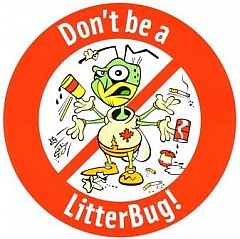October 13, 2015
Driving to Boston the other day I was stuck in a long, crawling line of traffic, so I squandered my time by people watching. One thing that I couldn’t help but notice was the amount of litter casually tossed out the car window. Of course the bulk of the tossed items were cigarette butts, but I noticed pieces of paper, plastics, etc., nonchalantly tossed out the window as well.
Whatever happened to litter awareness? We don’t seem to do that much anymore. When I was a child my mom scolded me for littering. “Don’t be a litterbug” was posted on waste bins. The “Crying Indian Man” ads were everywhere. The ad campaign, launched in the early 1970s by Keep America Beautiful, had the tag line--“People start pollution, people can stop it.” Sure, the “Crying Indian” was actually Italian and not Native American, but at least the message was powerful.
Also, when did ashtrays start to be eliminated from automobile manufacturing? Does the absence of an ashtray confirm the notion that it’s okay to toss the cigarette butt out the window? Or, if there’s no waste bin nearby it’s okay to toss my bottle or paper on the ground?
Littering—it’s not a victimless crime
Litter is unsightly and contributes to environmental contamination. Much of the stuff people toss on the ground can take years, even hundreds of years, to degrade. Litter can be transported long distance via storm water systems, landing in rivers and waterways.
Our oceans end up being the ultimate dumpsite with an estimated 80% of the marine debris coming from land-based sources, often winding up on beaches or simply churning in the ocean. Unfortunately, as we’ve all seen, such litter is frequently consumed by marine animals leading to deadly outcomes.
And, litter pickup is expensive.
Who and What
Cigarette butts are the least likely item to be placed in a trash receptacle, with less than 10% properly disposed.
Of course, not all littering is purposeful. Improperly secured garbage can fall off vehicles, items get blown by the wind, etc. Still, even most of this “negligent” type of litter is preventable with more care.
According to Rich McIlwain, Acting Chief Executive of Keep Britain Tidy, about one in five of people litter on a regular basis.
A study of littering in Maine, New Hampshire and Vermont conducted in 2010, found that most folks over the age of 55 don’t litter. Observations of littering in this study, and others, also found that young males (aged 18-24) are the predominant litterers. “Negligent littering,” items that unintentionally fall or are blown happens to people of all ages. However, young people ages 11-24 are more likely to participate in “deliberate” acts of littering.
The survey found that miscellaneous paper and plastic comprised the largest volume of litter “pieces” found, followed by candy, snack food, and fast-food packaging.
Why?
Numerous reasons can be identified for the reasons people litter:
- Lack of caring, lack of pride, entitlement to do what we want, general laziness. After all…someone else will pick it up!
- Out of sight, out of mind. If it’s tossed on the ground or out of the car then the litterer is off the hook for responsibility…right?!
- An undervaluing of resources. As Mr. McIlwain, with Keep Britain Tidy, aptly puts it, “Litter, waste and natural resources are inter-connected…If only people placed as much value on the packaging as the product inside, we might start to change behavior.”
- Ignorance – Lacking knowledge on the impact that littering has on the environment and others around us.
- Inconvenience—no ashtray in the car, no waste bins handy.
- Lenient law enforcement also contributes to littering behavior, although I’m sure law enforcement officers have more pressing things to worry about.
- As with illegal dumping, the mere presence of litter tends to invite more litter.
What’s the Solution?
 There are the obvious local solutions--increasing litter/illegal dumping penalties, adding more “no littering” signs, and placing more trash cans in particularly bad areas. Also, make sure that vehicle “secure your load” laws are enforced.
There are the obvious local solutions--increasing litter/illegal dumping penalties, adding more “no littering” signs, and placing more trash cans in particularly bad areas. Also, make sure that vehicle “secure your load” laws are enforced.
Ultimately it seems like littering has become another one of those things we don’t teach about anymore. We’ve given up on instilling in folks the message that littering is not acceptable and that we all are responsible for proper disposal. Is it just assumed that everyone knows the message so it doesn’t need to be in our face? Do we feel that supporting or joining community cleanups is enough?
I find it disconcerting that we don’t have any real messaging about the evils of littering, and that we’ve all grown to accept that it’s okay to toss our cigarettes on the ground. Or, that people can’t be bothered with holding onto their empty bottle until they find a recycle bin. The reality is that the cleanups are not keeping up with all the litter. Moreover, if we’ve stopped valuing the importance of responsible disposal, what else do we stop valuing?
By Athena Lee Bradley


Comments (0)
Add a Comment